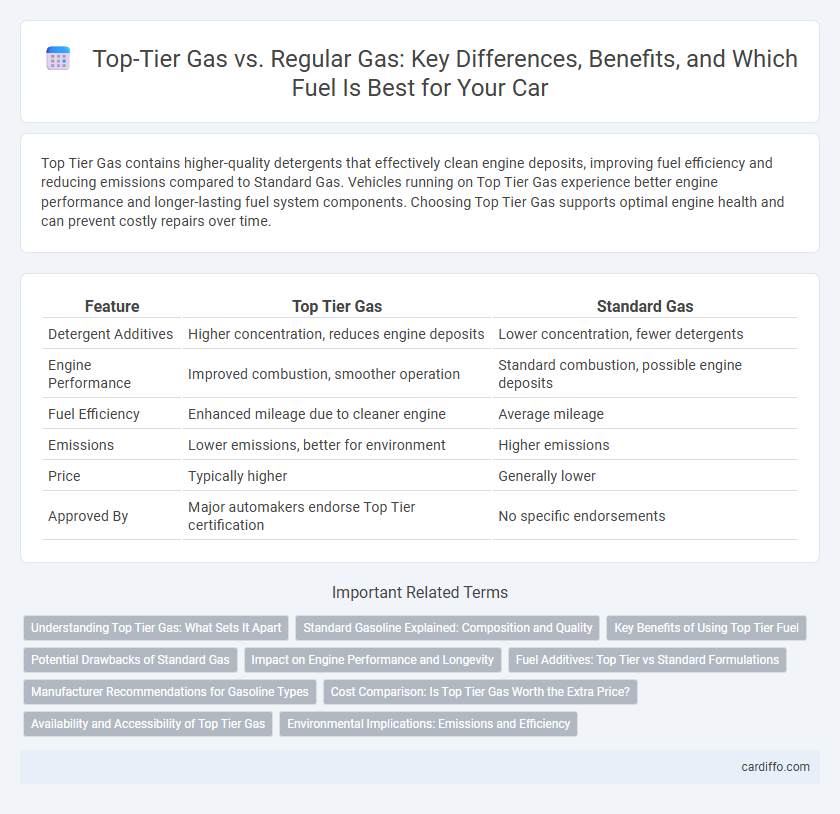Top Tier Gas contains higher-quality detergents that effectively clean engine deposits, improving fuel efficiency and reducing emissions compared to Standard Gas. Vehicles running on Top Tier Gas experience better engine performance and longer-lasting fuel system components. Choosing Top Tier Gas supports optimal engine health and can prevent costly repairs over time.
Table of Comparison
| Feature | Top Tier Gas | Standard Gas |
|---|---|---|
| Detergent Additives | Higher concentration, reduces engine deposits | Lower concentration, fewer detergents |
| Engine Performance | Improved combustion, smoother operation | Standard combustion, possible engine deposits |
| Fuel Efficiency | Enhanced mileage due to cleaner engine | Average mileage |
| Emissions | Lower emissions, better for environment | Higher emissions |
| Price | Typically higher | Generally lower |
| Approved By | Major automakers endorse Top Tier certification | No specific endorsements |
Understanding Top Tier Gas: What Sets It Apart
Top Tier Gas contains higher detergent standards approved by major automakers, designed to prevent deposit buildup in engines, which enhances performance and fuel efficiency. Unlike standard gas, Top Tier fuel surpasses Environmental Protection Agency (EPA) minimum detergent requirements, ensuring better combustion and reduced emissions. Using Top Tier Gas contributes to engine longevity and consistently cleaner intake valves.
Standard Gasoline Explained: Composition and Quality
Standard gasoline consists primarily of hydrocarbons derived from crude oil refining, containing additives for basic engine protection but lacking the enhanced detergent additives found in Top Tier gas. Its octane rating meets minimum federal requirements, ensuring adequate performance but with a higher propensity for engine deposits and reduced fuel system cleanliness over time. Standard gasoline's composition and additive package contribute to more frequent maintenance needs compared to Top Tier fuels, which promote better engine efficiency and longevity.
Key Benefits of Using Top Tier Fuel
Top Tier Gasoline contains higher levels of detergents that effectively clean and protect engine components, reducing carbon buildup and improving combustion efficiency. Using Top Tier fuel enhances engine performance, increases fuel economy, and helps maintain compliant emissions standards. This premium fuel choice supports longer engine life and fewer costly repairs compared to standard gas.
Potential Drawbacks of Standard Gas
Standard gas often contains lower levels of detergent additives, leading to increased engine deposits and reduced fuel injector efficiency. Over time, buildup from impurities can cause rough idling, decreased fuel economy, and higher emissions. Using standard gas may also result in more frequent engine maintenance due to carbon deposits affecting combustion performance.
Impact on Engine Performance and Longevity
Top Tier gas contains higher levels of detergents that prevent deposit buildup in fuel injectors and combustion chambers, enhancing engine performance and fuel efficiency compared to standard gas. Engines running on Top Tier fuel experience fewer issues like knocking and rough idling, which contributes to smoother operation and prolonged engine life. Long-term use of Top Tier gasoline helps maintain optimal compression and reduces wear on critical components, extending overall engine longevity.
Fuel Additives: Top Tier vs Standard Formulations
Top Tier gas contains enhanced fuel additives designed to reduce engine deposits, improve combustion efficiency, and protect vital engine components, outperforming standard gas formulations that typically use minimal additive packages. These advanced detergents in Top Tier fuels prevent intake valve and fuel injector deposits, promoting better fuel economy and lower emissions compared to standard gas. Automakers endorse Top Tier gas as essential for maintaining engine performance and longevity by adhering to stricter additive criteria.
Manufacturer Recommendations for Gasoline Types
Top Tier Gasoline meets higher detergent standards recommended by major automakers such as Honda, GM, and Toyota, ensuring better engine performance and reduced deposits. Manufacturers frequently advise using Top Tier fuel to maintain engine warranties and optimize fuel efficiency, especially in modern vehicles with advanced emission control systems. Standard gas often lacks these enhanced detergents, potentially leading to increased engine deposits and reduced long-term vehicle reliability.
Cost Comparison: Is Top Tier Gas Worth the Extra Price?
Top Tier Gas typically costs 10-20 cents more per gallon than standard gas, but it contains higher detergent levels that improve engine performance and longevity. Studies show that engines running on Top Tier Gas experience fewer deposit buildups, potentially reducing maintenance costs and enhancing fuel efficiency over time. While the upfront price is higher, the long-term savings on repairs and improved mileage often justify the extra expense for many drivers.
Availability and Accessibility of Top Tier Gas
Top Tier Gas is widely available at major fuel stations across the United States, offering consumers easy access to higher quality gasoline formulated with enhanced detergents for improved engine performance. While Standard Gas is more commonly found at a broader range of locations, Top Tier Gas availability is increasing as more gas stations prioritize offering premium fuel options. The growing accessibility of Top Tier Gas benefits drivers by providing better engine protection and cleaner fuel combustion in a convenient and expanding network of fuel providers.
Environmental Implications: Emissions and Efficiency
Top Tier Gas contains higher levels of detergent additives that improve engine combustion efficiency, resulting in lower emissions of harmful pollutants like NOx and carbon monoxide. Standard Gas often lacks these additives, leading to incomplete fuel combustion and increased release of greenhouse gases. Using Top Tier Gas contributes to better fuel economy and reduced environmental impact by promoting cleaner engine operation and minimizing toxic exhaust emissions.
Top Tier Gas vs Standard Gas Infographic

 cardiffo.com
cardiffo.com